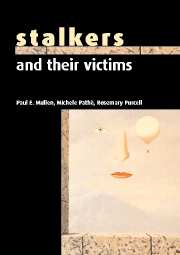Book contents
- Frontmatter
- Contents
- Acknowledgements
- Introduction
- 1 Stalking – a new categorization of human behaviour
- 2 The epidemiology of stalking
- 3 The victims of stalkers
- 4 Classifying stalkers
- 5 The rejected stalker and the resentful stalker
- 6 The predatory stalker
- 7 Intimacy seekers and incompetent suitors
- 8 The erotomanias and the morbid infatuations
- 9 Same gender stalking
- 10 Stalking by proxy
- 11 False victims of stalking
- 12 Stalking and assault
- 13 Reducing the impact of stalking
- 14 Defining and prosecuting the offence of stalking
- 15 Assessing and managing the stalker
- Appendix A Victim services
- Appendix B Important anti-stalking Acts/statutes
- Legal cases and references
- Index
1 - Stalking – a new categorization of human behaviour
Published online by Cambridge University Press: 05 March 2012
- Frontmatter
- Contents
- Acknowledgements
- Introduction
- 1 Stalking – a new categorization of human behaviour
- 2 The epidemiology of stalking
- 3 The victims of stalkers
- 4 Classifying stalkers
- 5 The rejected stalker and the resentful stalker
- 6 The predatory stalker
- 7 Intimacy seekers and incompetent suitors
- 8 The erotomanias and the morbid infatuations
- 9 Same gender stalking
- 10 Stalking by proxy
- 11 False victims of stalking
- 12 Stalking and assault
- 13 Reducing the impact of stalking
- 14 Defining and prosecuting the offence of stalking
- 15 Assessing and managing the stalker
- Appendix A Victim services
- Appendix B Important anti-stalking Acts/statutes
- Legal cases and references
- Index
Summary
Le grand malheur, de ne pouvoir être seul.
La BruyèreIntroduction
Stalkers and stalking are words that have acquired new connotations by being increasingly applied to individuals who persistently pursue, or otherwise intrude on, others. Stalking has emerged as a social problem that not only commands considerable public attention but is now, in many jurisdictions, a specific form of criminal offence. Stalking is increasingly attracting clinical and research interest among behavioural scientists and mental health professionals.
The word ‘stalk’ has the meaning of both the act of following one's prey and walking stealthily. To label someone a stalker has been, at least from the sixteenth century, to imply that he or she is a prowler or a poacher (Oxford English Dictionary, 1971). When the media appropriated the word to describe those who pestered and harassed others they provided a new focus for this ancient indictment.
‘Stalking’ is now part of our culture's language. It has become a category with which we describe and understand our experiences. If someone is repeatedly followed by a stranger, or is distressed at receiving numerous unwanted letters from an estranged partner then, in today's world, they are likely to describe themselves as being stalked. Looking back over their life they may now recall having been stalked in the past. At the time they might have described the experience as having been persistently pestered but now, retrospectively, it is recognized as their having been stalked.
- Type
- Chapter
- Information
- Stalkers and their Victims , pp. 5 - 25Publisher: Cambridge University PressPrint publication year: 2000



